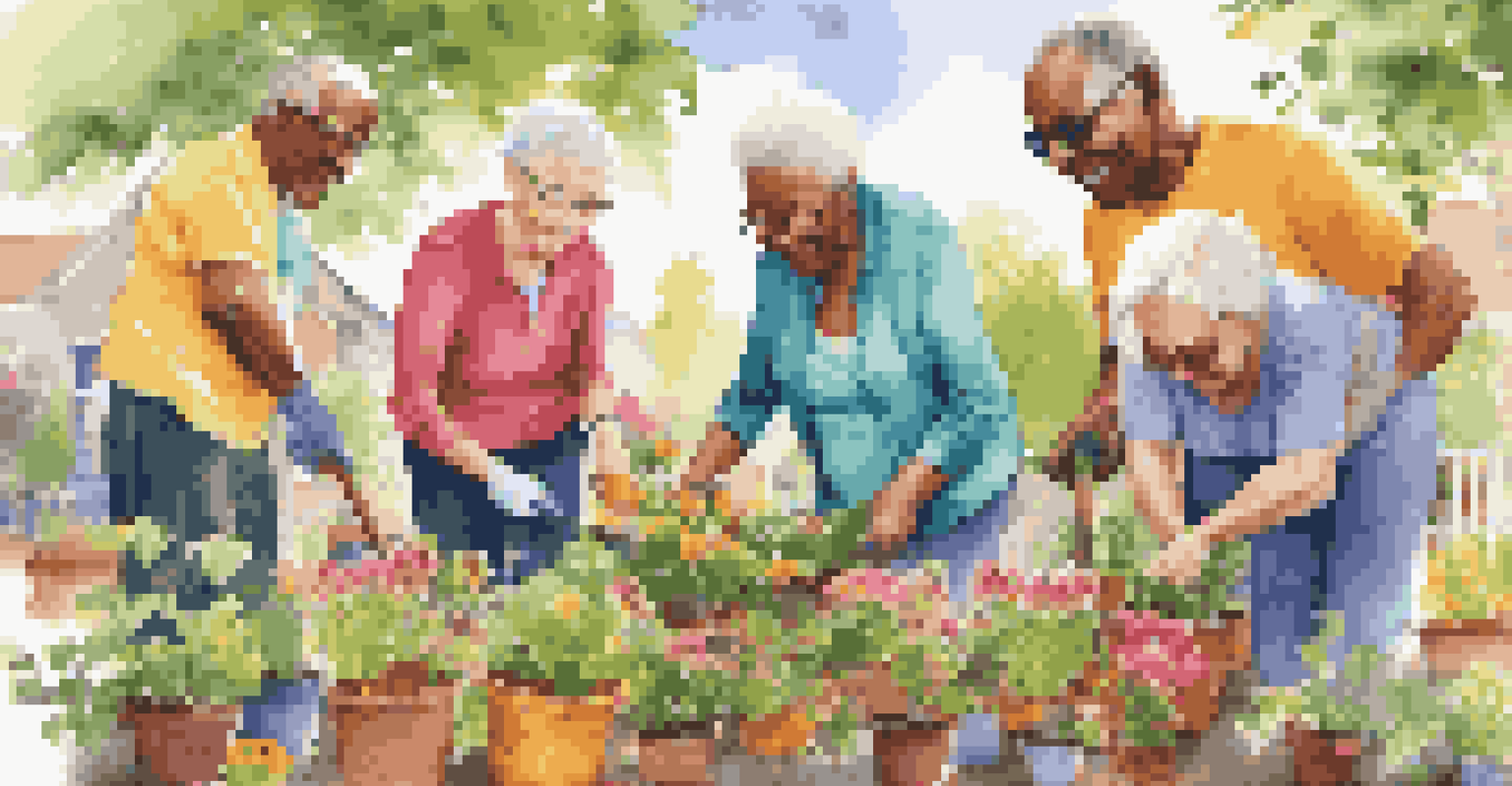How to Build a Support Network for Healthy Aging

Understanding the Importance of a Support Network
As we age, having a strong support network becomes increasingly important for our physical and mental well-being. Think of it like a safety net that helps catch us when we feel vulnerable, offering both practical assistance and emotional comfort. Studies have shown that older adults with a robust support system tend to experience better health outcomes and a higher quality of life.
The greatest gift of life is friendship, and I have received it.
Support networks can include family, friends, neighbors, and even community groups. These connections can provide companionship, encouragement, and help with daily tasks, making the aging process feel less daunting. Essentially, a support network empowers us to navigate life's challenges with greater confidence and ease.
Moreover, being part of a supportive community fosters a sense of belonging, which is crucial for mental health. It can combat feelings of loneliness and isolation that many seniors face, thus enhancing our overall happiness and longevity. So, investing time in building these relationships is truly a step toward healthy aging.
Identifying Your Support Needs
Before you can build a support network, it's essential to identify your specific needs. Are you looking for companionship, help with errands, or perhaps someone to share hobbies with? By acknowledging what you truly need, you can better understand the types of connections that will enrich your life.

Consider making a list of areas where you feel you could use support. This might include emotional support during tough times or practical help with daily tasks like grocery shopping or transportation. Once you have a clear picture, it becomes easier to reach out to the right people.
Support Networks Boost Well-Being
Having a strong support network significantly enhances both physical and mental health as we age.
Remember, your needs may change over time, so be open to reassessing them regularly. Life is dynamic, and as you adapt, your support network should evolve alongside you. This flexibility will ensure that the relationships you cultivate remain relevant and beneficial.
Reaching Out to Family and Friends
Family and friends are often the first line of support we can tap into as we age. Don't hesitate to reach out to them and express your needs; many people are more than willing to help but may not know how. A simple conversation can open doors to meaningful support.
Volunteers do not necessarily have the time; they just have the heart.
Consider scheduling regular calls or visits to maintain those connections, especially if distance is an issue. Try to share your experiences, worries, and joys to deepen those relationships. The more you engage, the stronger your bond will become, making it easier for them to offer assistance when needed.
If you're feeling shy or uncertain about reaching out, start small. Send a text or an email, or invite someone for coffee. Building these connections takes time, but the rewards are well worth the effort, as they can provide a significant boost to your emotional well-being.
Exploring Community Resources and Groups
Local community resources can be a fantastic way to expand your support network. Many communities offer programs designed specifically for seniors, including social clubs, fitness classes, and educational workshops. Participating in these activities can help you meet new people and foster friendships.
Don’t forget to look into local senior centers, libraries, and even online community boards. These places often host events and gatherings that can help you connect with others who share your interests. Whether it’s a book club, art class, or a gardening group, find something that excites you!
Identify Your Support Needs
Recognizing your specific needs helps you build meaningful connections that enrich your life.
Engaging with community resources not only helps you build relationships but also keeps you active and engaged. With a variety of options available, you’re likely to find a group that fits your personality and interests, ultimately enriching your aging experience.
Utilizing Technology to Stay Connected
In today's digital age, technology can be a valuable tool for building and maintaining your support network. Social media platforms, video calls, and messaging apps enable you to stay in touch with loved ones, regardless of geographical distances. Embracing these tools can help you feel closer to family and friends who may not live nearby.
Consider creating a family group chat or scheduling regular video calls with close friends. These virtual interactions can provide the same warmth and connection as in-person meetings, keeping your relationships strong. Plus, learning to use technology can be an empowering experience in itself!
If you're unsure about how to navigate technology, don't hesitate to ask for help from younger family members or friends. There are also many community classes available that focus on digital literacy for seniors. With a little guidance, you can confidently use technology to enhance your connections.
Volunteering and Giving Back to Others
Volunteering can be a powerful way to build a support network while also contributing to your community. Helping others not only fosters a sense of purpose but also connects you with like-minded individuals who share your values and interests. Whether you choose to volunteer at a local shelter, read to children, or participate in community clean-up events, the opportunities are endless.
Through volunteering, you can forge new friendships and be part of a larger community effort. These positive interactions can significantly enhance your social life and provide emotional support as you age. Plus, the act of giving back can boost your self-esteem and overall happiness.
Nurture Relationships Regularly
Regularly checking in and engaging in shared activities strengthens bonds within your support network.
Don't underestimate the impact of a shared mission; bonding over a common goal can lead to lasting friendships. So, look for opportunities that resonate with you and engage in activities that not only help others but also enrich your own life.
Maintaining and Nurturing Your Support Network
Building a support network is just the beginning; nurturing those relationships is equally important. Make it a point to check in regularly with friends and family, whether through calls, texts, or planned visits. Showing appreciation and gratitude for their support can strengthen your bonds and encourage ongoing connection.
Consider planning activities together, such as movie nights, potlucks, or game days. These shared experiences can deepen your relationships and create lasting memories. Remember, it’s the little moments that often mean the most.

Lastly, be open to reciprocating support. Offer your time and assistance to others in your network when they need it. Strong relationships are built on mutual support, so being there for each other will create a solid foundation for your connections.